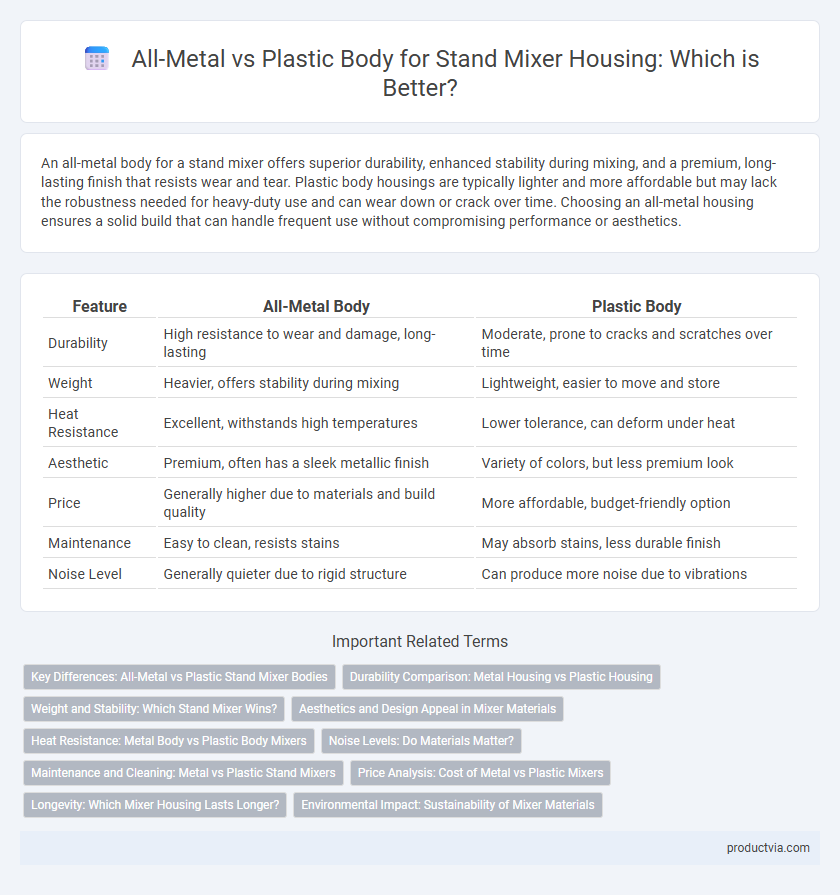An all-metal body for a stand mixer offers superior durability, enhanced stability during mixing, and a premium, long-lasting finish that resists wear and tear. Plastic body housings are typically lighter and more affordable but may lack the robustness needed for heavy-duty use and can wear down or crack over time. Choosing an all-metal housing ensures a solid build that can handle frequent use without compromising performance or aesthetics.
Table of Comparison
| Feature | All-Metal Body | Plastic Body |
|---|---|---|
| Durability | High resistance to wear and damage, long-lasting | Moderate, prone to cracks and scratches over time |
| Weight | Heavier, offers stability during mixing | Lightweight, easier to move and store |
| Heat Resistance | Excellent, withstands high temperatures | Lower tolerance, can deform under heat |
| Aesthetic | Premium, often has a sleek metallic finish | Variety of colors, but less premium look |
| Price | Generally higher due to materials and build quality | More affordable, budget-friendly option |
| Maintenance | Easy to clean, resists stains | May absorb stains, less durable finish |
| Noise Level | Generally quieter due to rigid structure | Can produce more noise due to vibrations |
Key Differences: All-Metal vs Plastic Stand Mixer Bodies
All-metal stand mixer bodies offer superior durability and heat resistance, ensuring long-lasting performance under heavy mixing tasks, while plastic bodies provide a lightweight and cost-effective alternative suited for occasional use. Metal housings also absorb vibrations better, reducing noise and enhancing stability during operation compared to their plastic counterparts. The choice between all-metal and plastic mixer bodies significantly impacts the appliance's longevity, weight, and price, influencing user experience and maintenance requirements.
Durability Comparison: Metal Housing vs Plastic Housing
Metal housing in stand mixers offers superior durability, resisting dents, cracks, and wear from frequent use and heavy mixing tasks. Plastic housing, while lighter and often more affordable, is prone to cracking and can degrade over time under continuous stress and exposure to kitchen heat. The all-metal body ensures long-term reliability and structural integrity, making it ideal for rigorous and professional baking environments.
Weight and Stability: Which Stand Mixer Wins?
All-metal body stand mixers offer superior weight and stability compared to plastic body models, providing a more durable and robust housing that reduces vibration during mixing. While plastic-bodied mixers are lighter and easier to move, they often lack the solid base required for heavy-duty mixing tasks, potentially causing wobbling or shifting. For users prioritizing stability and consistent performance, an all-metal housing typically ensures better balance and longevity.
Aesthetics and Design Appeal in Mixer Materials
An all-metal body for a stand mixer offers a sleek, premium aesthetic with a polished finish that enhances kitchen decor and conveys durability. In contrast, plastic body mixers provide more color variety and lightweight construction but often lack the high-end, sturdy appeal of metal. The choice of material significantly influences the mixer's visual impact and perceived quality, with metal housing typically favored for its classic, timeless design.
Heat Resistance: Metal Body vs Plastic Body Mixers
All-metal body stand mixers offer superior heat resistance, preventing warping or melting during extended or heavy-duty mixing tasks. Plastic body mixers may overheat under continuous use, potentially compromising performance and durability. Metal housing provides enhanced thermal conductivity, ensuring the motor stays cooler for longer-lasting operation.
Noise Levels: Do Materials Matter?
Stand mixers with all-metal bodies generally produce less noise during operation compared to plastic-bodied models due to metal's superior vibration dampening properties. Metal housings absorb and dissipate motor vibrations more effectively, resulting in quieter performance and enhanced durability. Plastic bodies tend to amplify noise through resonance, making metal mixers the preferred choice for users prioritizing low noise levels in their kitchen appliances.
Maintenance and Cleaning: Metal vs Plastic Stand Mixers
All-metal body stand mixers offer superior durability and withstand rigorous cleaning without damage, making maintenance easier and extending the appliance's lifespan. Plastic body mixers may be prone to scratches and discoloration over time, requiring more delicate cleaning methods to prevent wear. Metal housings resist stains and heat better, allowing for more aggressive cleaning agents without compromising the mixer's exterior integrity.
Price Analysis: Cost of Metal vs Plastic Mixers
All-metal body stand mixers typically command higher prices due to the durability, heat resistance, and premium feel of metal materials compared to plastic housings. Plastic body mixers are often more affordable, appealing to budget-conscious consumers, but may compromise on long-term sturdiness and vibration damping. Price analysis shows metal mixers generally offer better value over their lifespan despite the initial cost premium, supported by higher resale value and extended warranty coverage.
Longevity: Which Mixer Housing Lasts Longer?
All-metal bodies in stand mixers offer superior durability and resistance to wear, ensuring a longer lifespan compared to plastic housings prone to cracks and discoloration. Metal construction allows for better heat dissipation and structural integrity under heavy mixing tasks, contributing to enhanced longevity. While plastic housings may reduce overall weight and cost, they generally do not match the resilient and enduring performance of all-metal bodies in long-term use.
Environmental Impact: Sustainability of Mixer Materials
All-metal bodies for stand mixers offer greater durability and recyclability, reducing long-term environmental impact compared to plastic housings that often end up in landfills due to lower recyclability. Metal components typically have a longer lifespan, minimizing the need for frequent replacements and lowering resource consumption. Plastic bodies, while lighter and sometimes cheaper, contribute significantly to plastic waste and pose challenges in sustainable disposal and recycling processes.
All-metal body vs Plastic body for mixer housing Infographic

 productvia.com
productvia.com